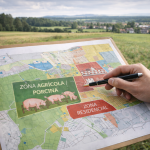The activity, which took place from November 20 to 25, was led by the Brazilian Ministry of Agriculture, who invited ChileCarne and the Chilean Agricultural and Livestock Service (SAG) as Chile’s representatives.
Various countries in South America organize drills on the entry of African Swine Fever (ASF) to test their contingency plans and organize the nationwide coordination. The spread of ASF observed in the last decade, and the confirmation of cases in the Dominican Republic and Haiti, has motivated these drills and an improvement in prevention and surveillance measures.
This African Swine Fever Drill was conducted in Brazil with the attendance of two representatives from Chile: Patricio Pérez, Head of Pig Health at the Chilean Agricultural and Livestock Service (SAG), and María Ignacia Apel, Head of Animal Health and Welfare at ChileCarne.
“The idea was for us to observe the drill and discuss the action plan in the event of an ASF outbreak in Brazil; on the other hand, it is an excellent exercise to apply things we don’t have in Chile in order to adapt or improve our own emergency plans,” Apel commented.
ChileCarne’s representative pointed out the highlights of the plan: «we celebrate what the Brazilian Ministry of Agriculture is doing, their structure, and how they carry out their field work. That is particularly outstanding. And also the way in which various agencies work in that country because the institutional framework is different from the one in Chile. In spite of the country’s size, they act in coordination, with a lot of support from the government to prevent the entry of ASF.”
In Chile, SAG and pork producers tested their emergency plan for the potential entry of ASF in November 2021. The exercise highlighted the importance of having a contingency plan that considers key issues for the industry, such as compensating producers, securing business continuity at the national level, mitigating the impact on exports, status recovery, and communication strategies to tackle the disease.
“I think we have many advantages in Chile and we are at the same level as Brazil. We are well organized in this sense,” Apel concluded.






